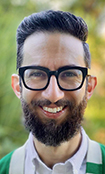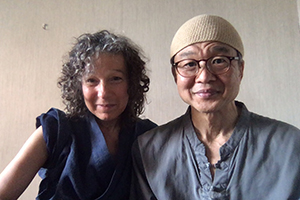By M. Evan Wolkenstein


NOVATO, California — She grew up in Brooklyn, New York, her roots deep in the Ashkenazi culture of Poland, Hungary, and Lithuania.
He grew up in Long Beach, California, a third generation Japanese American, and he barely knew a single Jewish person.
On paper, they might not sound like an obvious match: Jewish Brooklyn versus Buddhist Japan, kvetching as a collective mode of connection versus pursuit of inner peace. But while Leah and Randy Matsui may come from disparate ethnic backgrounds, “two different flavors” as Randy puts it, over the past four decades, they have become one woven unit, and their story teaches a great deal about what love is, what true connection looks like, and most significantly, what diverse Jewish journeys look like in the 21st century.
Leah and Randy’s story stands at the intersection of unique and familiar, intuitive and unpredictable, beginning with the fact that they now live in Japan, hours away from the nearest Jewish community—and yet, they are committed to exploring Jewish wisdom and life.
But maybe not in the way one would picture.
Growing up the granddaughter of a Holocaust survivor in New York, Leah believed that “everyone was Jewish.” Later, she encountered antisemitism in California and together with Randy, relocated to Japan, in part because of her desire to flee the hate she had experienced. However, rather than deny or hide from the role of the Holocaust in her life, in recent years she turned to Co-Counseling, a community of practice wherein partners talk about, feel, and release traumas locked inside the psyche. The organization assembled an international workshop called “Healing the Wounds of War,” which has included multiple trips to Auschwitz. She did not go to Auschwitz alone, but rather, with her husband Randy, who brings his own story of war, oppression, and intergenerational trauma.
During World War II, before Randy was born, his mother, father, and four of his older siblings had been given notice by the American government to pack their bags and report to a Japanese internment camp. This experience, in his words, “compacted the family,” causing them to always be “looking over their shoulders.” Meanwhile, Randy’s father’s family in Hiroshima would be killed or scarred by the terrible atomic bomb blast. In this way, Randy and Leah, as a Jewish-Buddhist-American-Japanese couple, share something transcultural: their inheritance of, and their desire to address, the trauma of war. They both speak the language of multigenerational survivorship. They share pain, but they also share a desire to find true healing.
But the story doesn’t end there.
The steps from Auschwitz to studying Torah together were happenstance: as part of Co-Counseling, they visited the United States for a workshop at American Jewish University (AJU) in Los Angeles. During that time, Randy spotted a flier for an introduction to Judaism class. Though they weren’t able to attend the class in person, from their home in Japan, 7,000 miles away from AJU, the Matsuis began to set their alarm clock for 1:30 a.m., joining the class virtually, and together, beginning the next chapter of their Jewish journey. “Class starts at 2,” Leah explains. “But we need time to fold up the futons.”
Leah describes her teacher, Rabbi Adam Greenwald, in a tone that approaches awe, beginning with the atmosphere in his sessions, masterfully crafted to make students feel “completely at home and totally welcome.” The class was, she recalls, full of people who “wanted to join the club.” She laughs with joy and delight at this idea—that others would be lining up, as it were, to have access to this community which she’d once taken for granted. As it turns out, this class is no hidden gem, and the open, welcoming atmosphere is no accident, but rather, it is built into the very mission of the program. Miller Introduction to Judaism at AJU is designed to give interfaith couples, individuals seeking to convert, and all those who want to find their home in the Jewish community a platform to access Jewish wisdom and practice. The program stands for the inclusion of every individual in the Jewish community.
As such, Leah and Randy are a picture of the program’s success, as they pursue Jewish life, even from as far away as Kumamoto, Japan. “We’re in the Judaism 101 class so we’re doing fundamental things,” Randy explains. “Shabbat, reading the parasha (weekly Torah portion), brocha (blessing) before meals. It’s been a life changer.” Leah adds humbly: “I wouldn’t say that I’m a really good Jew. I’m a Jew-in-process.” In truth, her and Randy’s dedication to the process and their embrace of their evolving Jewish identities speaks to the heart of what being a “good Jew” is. The traditional blessing for Torah study does not speak of completion or perfection, but rather, of being osek in the mitzvah—being occupied with the struggle to learn. Randy and Leah model this striving, this climbing, with enthusiasm, humor, and dedication.
The program was not Leah’s first taste of active Jewish practice as an adult. For decades, she’d been serving as a hospice worker, accompanying people and families through the final sacred, vulnerable, hours of life. Zen Buddhism was one of her primary sources of balance and peace. Then, Randy was diagnosed with terminal cancer. Suddenly and surprisingly, she found comfort in a deeply personal God. “Hashem,” she recalls, evoking one traditional, Jewish name for God, was with her in the “dark, terrifying hours of the morning.” She brought a Tanach (Hebrew Bible) to the hospital and even celebrated Shabbat with Randy—paper candles taking the place of hazardous open flame.
Against all odds, Randy survived the fight with cancer. Randy calls it a miracle. The experience contributed to years of seeking Jewish community in Japan. Then came the Co-Counseling workshop with visits to Auschwitz and, with virtual possibilities in a pandemic world, the online Intro to Judaism course with Rabbi Greenwald.
Like a selective typhoon, the pandemic pulled some communities apart, but others, it spared, propelling them onto the internet. Currently, Leah and Randy are a computer click away from connecting, belonging, and seeking.
Both Leah and Randy are inspired by what they perceive as the heart of Jewish civilization: the search for freedom and the end of oppression. Randy turns to Exodus, the Jewish Origin Story: “I love the tradition of people seeking to be free. And it’s not just for Jews, but it’s for everybody. It’s a blueprint for living.”
While the Passover Haggadah tells the story of the Jewish people from servitude to freedom, it focuses very little on the beginning and end of the story. Rather, it guides its participants on a journey of the senses, exploring the emotions and unpacking the ethical obligations of a people that has been through both unspeakable pain and unimaginable redemption. Randy says he’s inspired by the good thinking of “sages that have been working on human problems for the past few thousand years. The Haggadah is full of that “good thinking.” It teaches that Jews are bound by covenant to remember the trauma of others, to act with compassion and kindness, and to ask questions—even inconvenient, difficult questions.
Randy and Leah have spent much of their lives both striving to mend the pain of the past and comforting others. In this, there is something deeply Jewish about them. And to this, they have added the pursuit of ancient, sacred texts and wisdom. In that way, they are like the Haggdah’s “Wise child.” They know that the past informs the present and the future, and they want to know how to live—year to year and day to day—inspired by this truth.
Even if that requires boiling a pot of tea at 2 a.m., to join their teachers and friends, 7,000 miles away.
*
Evan Wolkenstein is a high school teacher and writer based in Novato, California. His work can be found in The Forward, Tablet Magazine, The Washington Post, Engadget, My Jewish Learning, and BimBam. His first novel, Turtle Boy, is winner of the 2021 Sydney Taylor Book Award.
i would like more info on the class that this couple have been taking
thank you
cecile moochnek 510 549 1018
art@cecilemoochnek.com